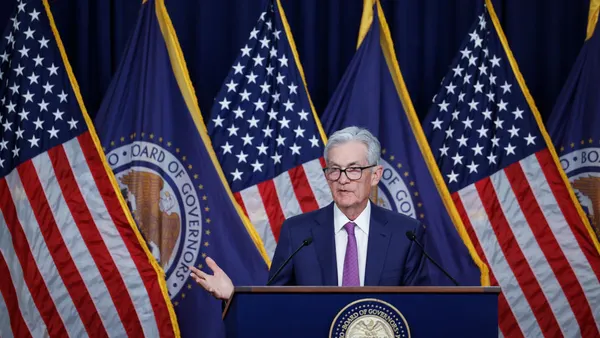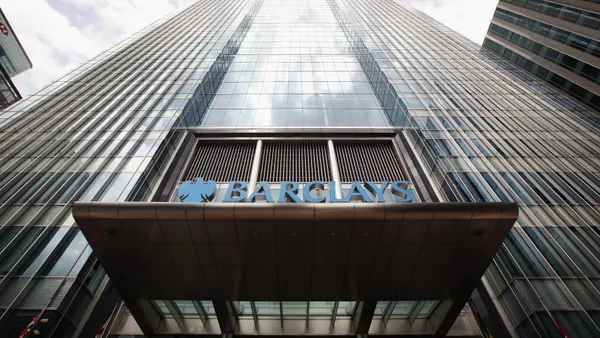Dive Brief:
- Virginia-based Blue Ridge Bank and FVCB have agreed to terminate their planned merger, the banks announced Thursday.
- The deal, announced in July and initially forecast for completion in the first quarter of 2022, was delayed in November, when the Office of the Comptroller of the Currency (OCC) found "certain regulatory concerns with Blue Ridge Bank.”
- "Our boards of directors mutually concluded after careful consideration that it would not be prudent to continue to pursue the proposed merger of our companies,” Blue Ridge CEO Brian Plum and FVCB CEO David Pijor said in a joint statement Thursday. “The termination of the merger agreement positions both companies to focus on the consistent growth and value creation they have each delivered through the years.”
Dive Insight:
Blue Ridge and FVCB will each cover its own costs and expenses related to the terminated transaction. Neither will pay a termination fee, the banks announced Thursday.
They did not say Thursday whether the OCC’s misgivings led the deal to fall apart. The merger would have created the fourth-largest Virginia-headquartered community bank, with roughly $5 billion in assets.
Neither the banks nor the OCC — in November or now — disclosed the details of the “concerns.” Blue Ridge was the subject of an April 2021 letter the Student Borrower Protection Center and other advocacy groups wrote to the regulator over an "income-share" lending option the bank offers in which students pledge some of their income earned after graduation.
The Charlottesville-based lender also made headlines in February for claiming to be the first commercial bank in the U.S. to offer access to Bitcoin at its ATMs.
Blue Ridge said in November it had begun an "initiative" to address the OCC’s issue.
"While we have additional work to do, we believe the OCC's concerns are ones that we can solve in a timely fashion, and do not materially impact the strategic rationale of the Merger," Plum said in a statement at the time.
FVCB in November gave the deal its vote of confidence. "We … know how committed Blue Ridge Bank's management team is to resolving any concerns raised by its regulators," Pijor said at the time. "We strongly believe that this transformational partnership remains strategically and financially attractive … and we are committed to seeing it through to completion.”
The Blue Ridge-FVCB was one of several tie-ups whose timelines were pushed back last fall. VyStar Credit Union and Heritage Southeast Bank agreed in October to postpone until Feb. 28 the date by which they can terminate VyStar’s proposed acquisition of the bank. The transaction, at that time, needed regulatory approvals from the Federal Deposit Insurance Corp. (FDIC), the National Credit Union Administration (NCUA), the Georgia Department of Banking and Finance and the Florida Office of Financial Regulation, Heritage said.
New York Community Bank, also in October, said it didn't expect its $2.6 billion acquisition of Michigan-based Flagstar Bank to get state and federal regulators’ approval before the end of 2021 as it had hoped.
Prospects appear to be brightening for other deals that looked to be in limbo. Evansville, Indiana-based Old National Bank last week struck an optimistic tone over its pending acquisition of Chicago-based First Midwest Bank. Old National CEO Jim Ryan said the bank expects the deal to be complete early this year, according to American Banker.
“While we're still waiting on Federal Reserve approval, we continue to have frequent and constructive dialogue with the Fed staff, who assure us our application is complete and ready for review” by the central bank’s board, Ryan said during a fourth-quarter earnings call.
An Indianapolis-based fair-housing advocacy group sued Old National in October, accusing the bank of redlining.
The Fed signed off on three mergers in mid-December, including a $2.2 billion tie-up between First Citizens BancShares and CIT Group. Those banks in September extended until March the timeline to complete that transaction.
Others didn't fare as well. Green Dot in October pulled out of its plan to buy Louisville, Kentucky-based Republic Bank’s tax refund processing unit, saying it was unable to get the Fed’s approval or non-objection — an action that spurred Republic to sue.
In Tennessee, a county chancery court judge issued an injunction in November temporarily halting Memphis-based Orion Federal Credit Union’s proposed acquisition of Financial Federal Bank as the financial institutions and a state regulator haggle over the meaning of "acquire."
The Tennessee Department of Financial Institutions argues the word, as defined in the Tennessee Banking Act, limits the scope of a bank acquisition to its stock and charter and would forbid the assumption of assets. The credit union and bank, however, argue the Tennessee Banking Act doesn't explicitly define "acquire" and that a less ambiguous source should be used.













